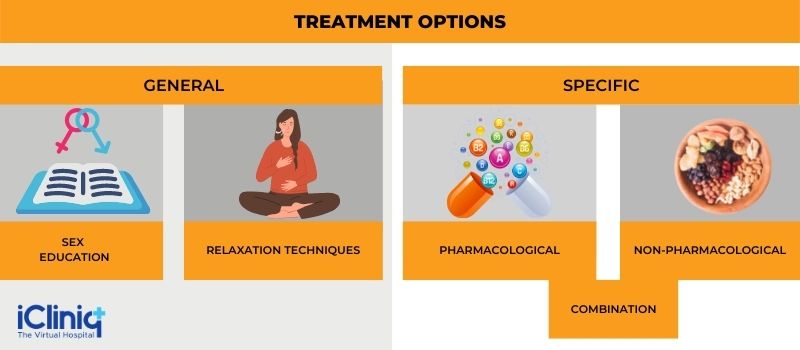What Is Sexual Dysfunction?
Sexual dysfunction occurs when sexual problems arise from physical or psychological illnesses and prevent one or both partners from experiencing sexual satisfaction.
What Is Psychosexual Dysfunction?
Psychosexual dysfunction occurs when sexual problems originate in psychological distress rather than pathological disease.
What Are the Psychological Causes and Factors that Contribute to Sexual Disorders?
Some of the psychological reasons that contribute to sexual problems may include:
-
Previous sexual trauma.
-
Performance anxiety.
-
Body image issues.
-
Relationship problems.
-
Cultural and societal taboos and ingrained ideas about sex.
The psychological factors that contribute to sexual disorders are categorized for clinical purposes of diagnosis into three:
-
Predisposing factors.
-
Precipitating factors.
-
Maintaining factors.

What Are the Signs and Symptoms of Psychosexual Dysfunction and How is Psychosexual Dysfunction Recognized and Diagnosed?
Commonly experienced signs and symptoms with psychosexual dysfunction are:
In Men:
-
Erectile Dysfunction: Inability to achieve an erection.
-
Retarded Ejaculation: Delay in ejaculation or no ejaculation.
-
Premature Ejaculation: Early ejaculation due to an inability to control ejaculation timing.
In Women:
-
Orgasmic Dysfunction: Inability to achieve orgasm.
-
Vaginal Dryness: Insufficient or absent vaginal lubrication before and during intercourse.
-
Vaginismus: Inability to relax the vaginal muscles during intercourse due to fear of penetration, leading to extreme pain during penetration.
Both Sexes:
-
Lack of sexual arousal or desire.
Often, the patient realizes that their inability to experience sexual enjoyment is hampering their sexual relationship. Acknowledging the issue and reaching out to a physician is difficult due to feelings of guilt or shame - this is a significant reason why so many cases of sexual dysfunction go undiagnosed and untreated. However, it is also the most crucial step in diagnosing sexual disorders.
The physician will ask for a complete medical history, including the symptoms experienced and any previous history of relevant diseases or psychological illnesses. Evaluating the psychosocial factors and attitudes inducive of psychosexual problems is essential.

These evaluations are necessary for various reasons:
-
Doctors may find that some patients do not actually exhibit sexual dysfunction. Instead, their attitudes and beliefs concerning sex coupled with inherent inhibitions cause their problems. Often, these beliefs and inhibitions are influenced by cultural and societal restrictions and perceptions, as well as religious outlook and ethnic backgrounds.
-
Anxiety and depression can increase heart rate, blood pressure, and fatigue and reduce sexual satisfaction. These factors can also indicate the presence of other pathological conditions.
-
Poor communication within relationships affects sexual intimacy. Factors like gender equality, commitment levels, personality clashes, and differing sexual expectations contribute to sexual dissatisfaction.
-
Performance anxiety is responsible for many cases of sexual dysfunction in men and women. Negativity and worry about sexual performance or unrelated daily life problems are the primary causes of performance anxiety.
-
Effective treatment relies on the patient’s motivation and willingness to undergo therapy. Unmotivated patients would benefit from direct medication rather than counseling or guided sex therapy without a medical prescription.
How Is Psychosexual Dysfunction Treated?
Treatment begins with the physician and patient or couple establishing treatment goals. The physician will then outline the treatment modalities available to the patient. Partners must be involved since treatment selection will often rely on their support and participation. The choice made by the couple will be considered the first option. In the case of a single patient, the treatment option selected will rely solely on their discretion and outcome goals.
Treatment options are broadly classified into general and specific treatment methods:

-
Sex Education: Educating patients on sexual behavior and intimacy can reassure them and help improve their sex lives.
-
Relaxation Exercises: Relaxation therapies such as Jacobson's Progressive Muscular Relaxation Technique or Benson Henry Relaxation Technique can help overcome anxiety.
-
Sex Therapy: When clinicians cannot directly treat psychological causes, sex therapy may come in useful. Therapists can provide perspectives on sexual and marital intimacy and issues. It is also essential from a gender-specific perspective. Studies have shown that men generally experience sexual difficulty due to psychological issues and occupational stresses. At the same time, women can attribute their sexual problems to relationship factors - this indicates the need for targeted sex therapy that focuses on the fundamental causative factor.
-
Behavioral Treatments: For patients suffering from behavioral disorders, balanced perspectives on harmful behavior and techniques for self-stimulation are helpful.
-
Psychotherapy: Critical in cases with a history of sexual trauma and abuse, psychotherapy with a trained counselor will encourage patients to explore past causes and present effects and learn emotionally stable and mature ways of dealing with these.
-
Guided Imagery: Guided imagery uses a scripted descriptive scenario that leads patients into a light, trance-like state and taps into the unconscious mind. Research indicates that men who undergo guided imagery and sexual re-education can successfully improve their sexual lives and overcome anxiety and stress.
It should always be kept in mind that the goal of treatment is not perfection but enhanced pleasure.
What Are Some Alternative Therapies to Overcome Psychosexual Dysfunction?
Alternative therapies that can be explored include:
-
Meditation.
-
Yoga.
-
Acupuncture.
While not recommended as first-line therapy, such treatments may assist with relaxation and stress and anxiety management, which will, in turn, contribute to better sexual functioning.
Why Is It Important to Identify and Treat Psychological Causes for Sexual Problems?
Psychological problems are frequently associated with other physical conditions such as:
-
Heart problems.
-
High blood pressure.
-
High levels of cholesterol.
Conversely, these conditions may be responsible for causing psychological stress.
In either case, identifying and treating underlying causes is important. Ignoring or failing to explore significant physiological causes interrelated with sexual dysfunction and psychological problems may result in dangerous health outcomes.
Conclusion:
Sexual problems related to psychological causes are usually successfully treated with time and patience. Patients and couples who actively participate in suggested treatment and therapy options and maintain a positive outlook will eventually emerge victorious from sexual slumps and setbacks.












